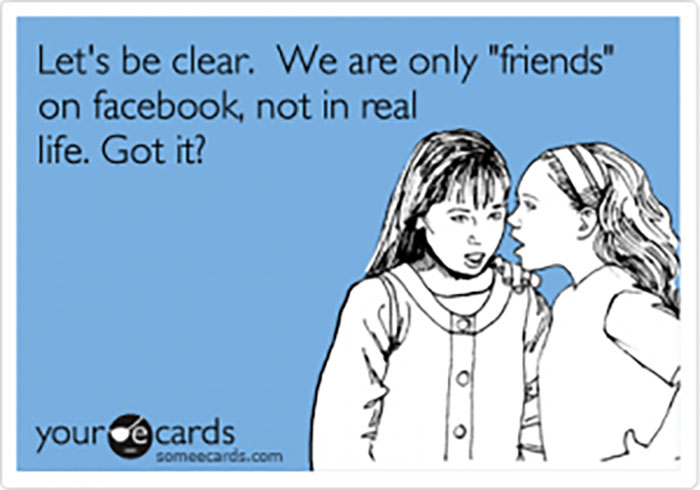Yesterday, I wrote this article about trying to make friends over 30. I then went to an adult kickball league game — in an effort to, in fact, make friends over age 30 — and I didn’t necessarily get any closer to that goal. (Oh well.) But my article started performing better — it’s all relative, of course — so I started thinking a little more about the issue, and how it relates back to social media. Social media is one of those things like heavy metal music; it’s really easy to look at it and say, “Well, this societal problem is tied to social media in some way,” but it’s a lot harder to actually prove something like that.
First things first: I’ve thought about quitting Facebook before. I haven’t. I probably won’t. I’m weak and the reason is FOMO. No doubt.
If you look at the “make friends over 30” article, sociologists have been saying since the 1950s that there are three essential elements for the development of real friendship:
- Proximity
- Repeated and unplanned interactions
- A setting that lets people put their guard down and confide in each other
OK, got that?
Now think about this: how do you, or most people you know, use something like Facebook?
Consider this:
- Proximity: Facebook can easily give the illusion of proximity. For example, a couple of weeks ago (maybe a month or more), my wife was contemplating calling one of her friends on a Sunday. She said, “Well, I guess I could call her now, but I don’t know, I don’t want to disturb what she’s doing…” Within about 10 seconds, I told her, “She’s eating at this place in the town where she lives. Looks like they have good bread dishes.” That’s terrifying that I can know all that within about 1/6th of a minute, but that’s the world. You see your friends on vacation or at bars or at festivals or doing whatever, and you think you know their lives and where they’re at, what they’re up to. It can ape the sensation of proximity. But in reality, it’s superficial. I just saw a picture of my in-laws eating chocolate in Madrid. Awesome. I know they’re in Madrid and enjoying fine foods. It feels like there’s some proximity in relationship, but there’s not. I have no idea anything about the broader context of that trip whatsoever.
- Repeated and Unplanned Interactions: Facebook kind of butchered this for a lot of people. Again, you feel as if you know what’s going on with those “close” to you, but you don’t really. You know about the actions and the events. You don’t necessarily know about the context behind anything. I can’t tell you how many conversations I’ve had in the last eight years where someone has said, “Oh well I knew X-and-Y about you because of Facebook.” That’s a really powerful sentiment, and that’s why Mark Zuckerberg is on all those rich-people lists. But it’s also not necessarily real human connection. It’s knowledge without backstory, which is essentially very little. You could have seen a pic of me in Vegas and been like, “Oh, he’s doing well and enjoying life.” Maybe that was the worst trip of my life. You’d have no idea. That leads into this:
- Putting Your Guard Down, Confiding In Each Other: There are some people that do this on Facebook — but then they tend to get mocked for over-sharing and sit the f*ck back down — but in general, Facebook is a very curated environment. You want people to think you’re happy and your life is great and you’re doing things and checking boxes. People remove unflattering photos in a cocaine heartbeat from there. People take down posts that are too close to the truth of a situation. (I’ve done both.) Facebook is not a transparent, open space — in fact, quite often when people do take to FB to complain about life, they do it in that trifling “vague-booking” way where they’re semi-dancing around an issue but not really actually saying what the issue is. (Again, guilty of this.)
You could say that I’m making too emotional, or too misguided, of a case above — and you might be right. I might be lacking some context, sure. But if you think about the three elements that academics seem to agree upon in terms of developing friendships, Facebook really fosters none of them in terms of helping to maintain friendships in any type of legitimate, non-superficial way.
Now, by the same token, you could argue that Facebook has been revolutionary in terms of re-connecting people, increasing the ease of communications, etc. — but then again, maybe that’s the program. Whenever you make a process like communication with friends and loved ones easier, you’re by definition removing some of the context from it. Right?
Do you think Facebook and other social platforms have eroded the quality of some of your relationships?
